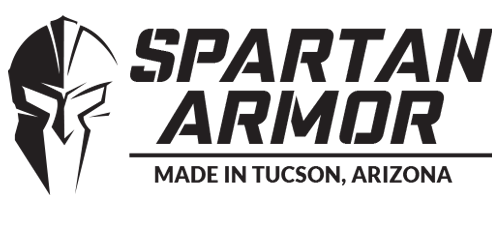Myths About Body Armor
Popular TV shows and movies will have many people thinking that body armor is an impenetrable shield that deflect bullets like they’re nothing. However, bulletproof vests can only provide a certain level of protection for the wearer, and some even break after being impacted by multiple rounds. If you’re considering purchasing body armor, it’s important to learn the myths and truths about bulletproof vests, body armor carriers and body armor plates to understand what type of body armor will provide the level of protection you need.
Myth #1: Bulletproof Vests Are Bulletproof
As we mentioned earlier, it is common belief that bulletproof vests are truly bulletproof, but they aren’t. They are what we call “bullet resistant.” Meaning, they help to mitigate the impact of bullets, preventing them from penetrating the wearer’s skin. Bulletproof vests help to save the lives of police officers and other public safety officials every day, but don’t necessarily prevent wearers from ending up in the hospital to recover from getting hit.
Myth #2: Body Armor Can Protect Against All Types of Ammunition
Not all body armor can protect against all types of ammunition. There are different levels of body armor that vary in protection capabilities. The National Institute of Justice (NIJ), an agency of the Department of Justice (DOJ), is responsible for setting, testing and improving standards for body armor in the U.S. These standards ensure a certain level of protection for various body armor products, and can help you decide which NIJ body armor rating is best for you. The higher the rating level, the thicker, heavier and less flexible the body armor.
The ratings and their protection levels are:
Level IIA: Tested to stop 9mm and .40 S&W ammunition fired from short barrel handguns. Does not include rifle ammunition protection.
Level II: Tested to stop 9mm and .357 Magnum ammunition fired from short barrel handguns. Does not include rifle ammunition protection.
Level IIIA: Tested to stop .357 SIG and .44 Magnum ammunition fired from longer barrel handguns. Does not include rifle ammunition protection.
Level III: Tested to stop 7.62mm FMJ lead core rifle ammunition. 5.56/.223 JHP ammunition with lead cores typically used for hunting and target shooting can be stopped with Level III hard body armor.
Level IV: Tested to stop .30cal steel core armor piercing rifle ammunition. Level IV is the best choice for stopping military-grade 5.56/.223 FMJ, M855 ammunition, made with steel or partial steel core.
Myth #3: Bulletproof Vests Can Also Protect Against Stabbing Weapons
Many people believe that if a bulletproof vest cannot be penetrated by bullets, then it can also stop stabbing weapons. But that isn’t the case. In fact, there are different classifications for body armor’s ability to protect against stabbing weapons. In general, stab-resistant body armor should provide protection from injury from knives, edged weapons and sharp-pointed weapons.
There are two classes of stab-resistant body armor, one of which provides protection for threats that might be expected “on the street” from high-quality, edged blade knives. The second provides protection for threats that might be expected in a corrections type environment, such as stabbing with lower-quality knife blades and spike-style weapons. Within these two classes, there are three levels:
Level 1: Represents low-level protection that is designed for extended wear and is usually concealable (covert).
Level 2: Mid-level personal protection that is suitable for extended wear and can be covert or overt (non-concealable).
Level 3: Represents high-level protection that is designed for wear in high risk situations and is generally overt.
Within these three levels, there are further ratings that indicate the stab energy the body armor is expected to handle.
While you can purchase multi-threat body armor vests that protect against both bullets and stabbing weapons, it’s important to make sure it clearly states the ratings for both ammunition and hand weapons.
Myth #4: Body Armor Completely Absorbs the Impact from Bullets, Making It Painless
In many movies, you often see a police officer getting hit with multiple bullets but seeming relatively unaffected by the blows. This is a misrepresentation of what it’s like to get hit with ammunition while wearing body armor. Since body armor isn’t a bulletproof force field, it is likely that the wearer will be knocked down and temporarily immobilized when hit with ammunition. When hit by any type of bullet, body armor wearers will likely experience bruising and possibly even internal bleeding and cracked ribs, along with pain.
Myth #5: All Body Armor Is the Same
Along with different protection ratings, body armor differs in materials. At Spartan Armor, we carry steel core body armor and composite/ceramic body armor. Steel core body armor is made from tempered steel, is known for its high protection ratings and durability, and is often used by the military.
Composite/ceramic body armor is lighter than steel core body armor, and is designed to provide the same level of protection with added flexibility, wearability and convenience. However, composite/ceramic can shatter when hit with multiple rounds in the same area.
Myth #6: Body Armor Is Completely Undetectable Under Clothing
There is overt and covert body armor. Only covert (concealable) body armor can be worn under clothes, and even then, it may not always be completely hidden. Covert body armor is thinner and more flexible than other types of body armor, and offers protection up to Level IIIA. Body armor over IIIA is nearly impossible to wear under everyday clothing.
Myth #7: There Are No Regulations Regarding Body Armor in the U.S.
Many people believe that because body armor is legal for anyone to buy, and that it has no regulations regarding its sale and use. That’s untrue. While body armor is legal for civilians to purchase, anyone convicted of a violent crime cannot legally purchase, own, use or even be in possession of body armor. It is also illegal in some states to wear body armor while on school premises or at school-sponsored events. In many states, wearing body armor while committing a crime is a crime in itself.
Body armor has come under fire following recent tragic events, with some questioning whether regular civilians should be allowed to purchase and use body armor. We at Spartan Armor firmly believe that it is every American’s right to have personal protection. As of today, you can still purchase personal body armor without background checks or FBI approval.
Body Armor Protection from Spartan Armor Systems
For all of your body armor needs, look no further than Spartan Armor Systems. We offer superior quality steel core and composite/ceramic body armor plates, plate carriers and other top-of-the-line tactical gear at fair prices.
Consider purchasing one of our body armor packages to take out all the guesswork of choosing the right body armor and accessories. The Level III+ AR550 Certified Plates and Sentinel Plate Carrier Package includes our Spartan Sentinel plate carrier with two 10x12 AR550 Body Armor Single Curve plates with a full coat of our Encapsuloc™ anti-fragmentation coating, and two AR550 Side Plates (base coat).
Alternatively, for slightly less our AR550 Level III+ Body Armor Certified Plates and Spartan Cyclone Lightweight Sentry Plate Carrier Package includes the Spartan Sentinel Plate Carrier with one front and back AR550 shooters cut steel armor plate with a single curve and full coat for increased wearability.
If you have any questions about body armor, or if you’d like help with choosing the right products to meet your needs, call our expert body armor staff at (520) 396-3335, or contact us using our convenient online form.


